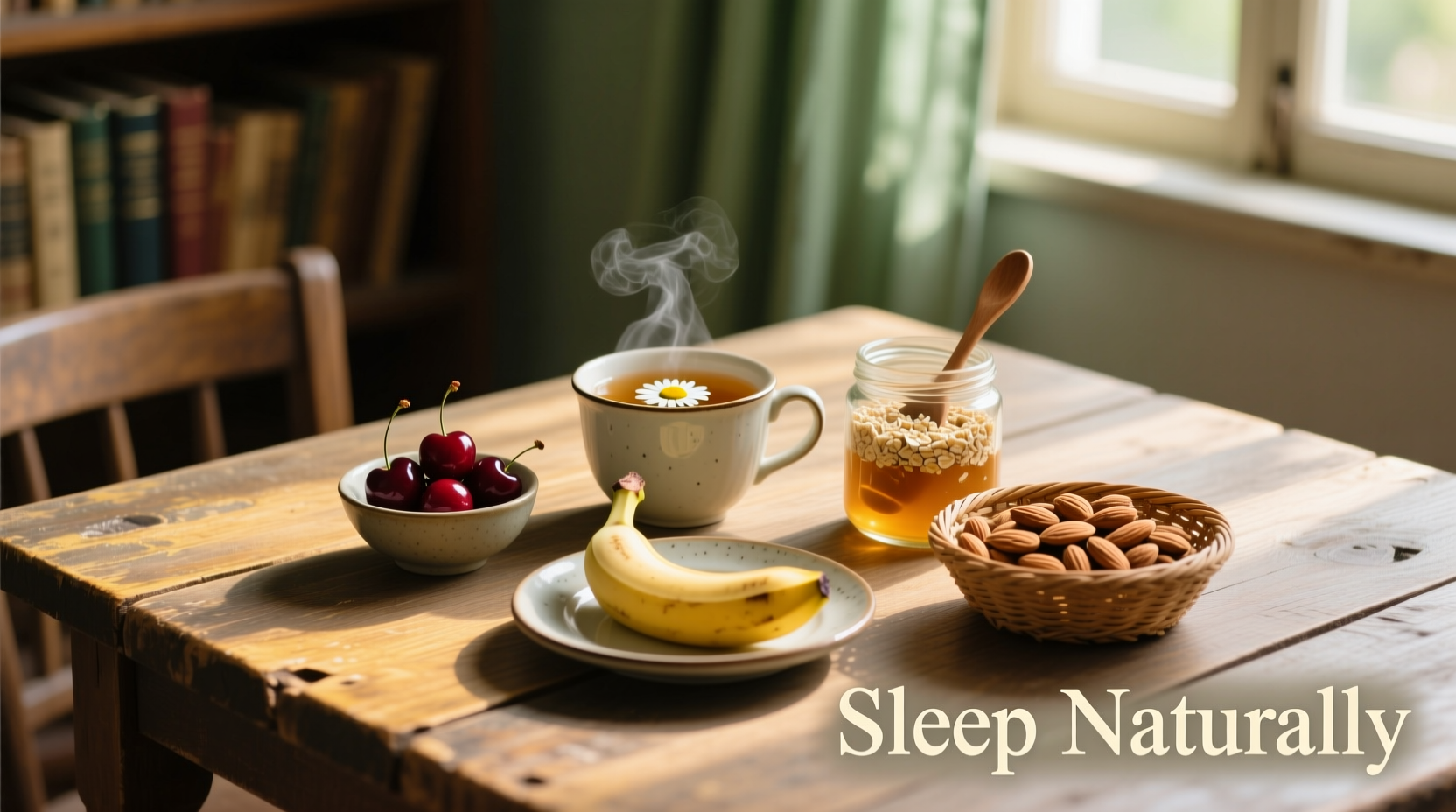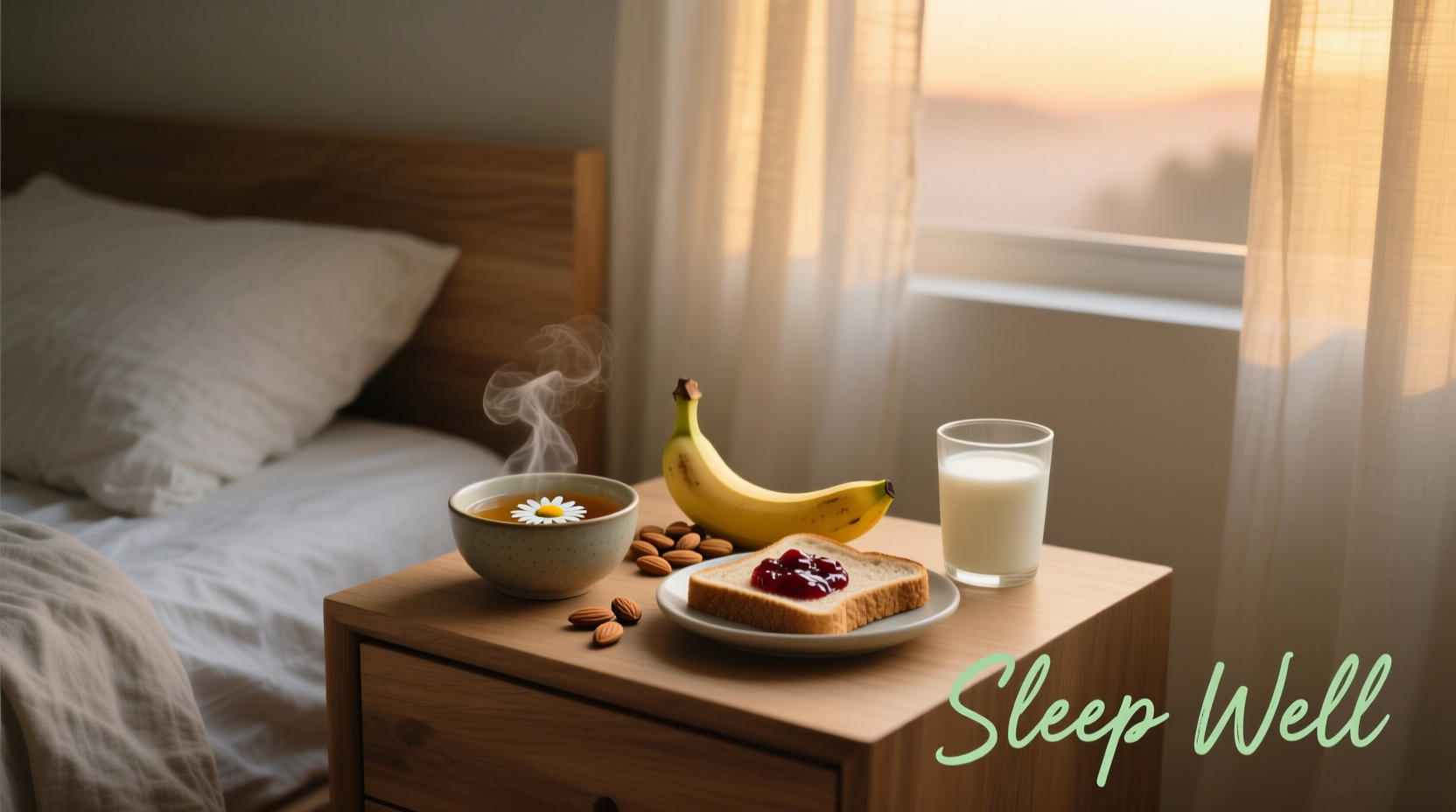Cherries, kiwi, almonds, fatty fish, and warm milk are scientifically proven to improve sleep quality. These foods contain natural compounds like melatonin, magnesium, and tryptophan that regulate your sleep-wake cycle. Consuming them 1-2 hours before bedtime yields the best results for most people.
If you've ever tossed and turned at 2 a.m. wondering why sleep won't come, you're not alone. Over 30% of adults struggle with insomnia symptoms, according to the Centers for Disease Control and Prevention. While prescription sleep aids exist, many prefer natural solutions that work with your body's biology. This guide reveals exactly which foods help you sleep based on clinical research—not just anecdotal claims. You'll learn precisely how much to consume, when to eat them, and why they work, so you can create an effective evening routine tonight.
The Science Behind Food and Sleep
Your diet directly impacts your circadian rhythm through specific compounds that influence sleep-regulating hormones. Two key mechanisms explain why certain foods help you sleep:
- Tryptophan pathway: An essential amino acid that converts to serotonin, then to melatonin—the "sleep hormone"
- Mineral effects: Magnesium and calcium regulate GABA receptors that calm nervous system activity
According to a 2018 review in Nutrients journal, foods containing these compounds can increase sleep duration by 20-30 minutes and improve sleep quality scores by 15-25% when consumed consistently.
Top 7 Foods That Help You Sleep (With Evidence)
1. Tart Cherries
Natural melatonin powerhouses, tart cherries contain up to 13x more melatonin than sweet varieties. A Northumbria University study found participants drinking 8 ounces of tart cherry juice before bed:
- Slept 84 minutes longer on average
- Reported 25% better sleep quality
- Experienced fewer nighttime awakenings
How to use: Consume 1 cup tart cherry juice or ½ cup dried tart cherries 1-2 hours before bed. Avoid sweetened varieties that spike blood sugar.
2. Kiwifruit
This fuzzy fruit contains serotonin, antioxidants, and folate that improve sleep onset and duration. In a Taiwanese study, adults eating two kiwis one hour before bed for four weeks:
- Fell asleep 34% faster
- Slept 42 minutes longer per night
- Reported better sleep efficiency (time actually spent sleeping)
How to use: Eat two whole kiwis with skin (most nutrients are in the skin) one hour before bed.
3. Almonds
These nuts deliver magnesium and healthy fats that regulate melatonin production. Just one ounce (about 23 almonds) provides:
| Nutrient | Amount per Ounce | % Daily Value |
|---|---|---|
| Magnesium | 76.5mg | 18% |
| Protein | 6g | 12% |
| Healthy Fats | 14g | 18% |
A 2017 study in Nutrients showed magnesium supplementation improved insomnia scores by 34% in older adults. While almonds alone won't provide therapeutic doses, they contribute meaningfully to your daily intake.
How to use: Eat 1 ounce (about 23) raw or dry-roasted almonds 1-2 hours before bed. Avoid salted varieties that may cause nighttime thirst.
4. Fatty Fish
Salmon, mackerel, and trout contain omega-3s and vitamin D that regulate serotonin production. In a University of Oxford study, participants eating salmon three times weekly:
- Slept nearly an hour longer
- Reported better morning alertness
- Showed improved vitamin D levels (linked to melatonin regulation)
How to use: Consume 4-6 ounces grilled or baked fatty fish at dinner. Pair with complex carbs like sweet potato for optimal tryptophan absorption.
5. Warm Milk
Despite popular belief, milk's sleep benefits come more from ritual than tryptophan content. However, a 2018 review confirmed:
- Milk contains bioactive peptides that reduce stress
- Calcium enhances tryptophan's conversion to melatonin
- Warm beverages trigger thermoregulation that promotes sleepiness
How to use: Heat 8 ounces of milk (dairy or fortified plant-based) until warm but not boiling. Add cinnamon for blood sugar stability.
6. Walnuts
These nuts contain melatonin (3.5 ng/g) and healthy fats that support brain health. Research in Nutrition Journal shows walnuts:
- Increase blood melatonin levels significantly
- Provide omega-3s that reduce inflammation linked to poor sleep
- Contain magnesium that relaxes muscles
How to use: Eat 14 halves (1 ounce) 1-2 hours before bed. Pair with a small apple for sustained blood sugar.
7. Chamomile Tea
This herbal tea contains apigenin, an antioxidant that binds to GABA receptors. A 2016 study found postpartum women drinking chamomile tea for two weeks:
- Reported 15% better sleep quality
- Experienced less daytime fatigue
- Showed reduced anxiety scores
How to use: Steep one tea bag in 8 ounces hot water for 5 minutes. Drink 30 minutes before bed. Avoid adding sugar.
When These Foods Might Not Work (Context Boundaries)
While these foods help many people sleep better, effectiveness varies based on individual factors:
- Medical conditions: Sleep apnea or chronic pain may require medical intervention beyond dietary changes
- Timing issues: Consuming large portions too close to bedtime can cause indigestion
- Dietary restrictions: Nut allergies or lactose intolerance require substitutions
- Severe insomnia: Clinical insomnia often needs professional treatment
The National Sleep Foundation recommends consulting a healthcare provider if sleep problems persist for more than three weeks despite lifestyle changes.
Foods to Avoid Before Bed
Certain foods actively disrupt sleep patterns. Avoid these within 3 hours of bedtime:
- Caffeine (coffee, tea, chocolate) - blocks adenosine receptors
- High-sugar foods - cause blood sugar spikes and crashes
- Spicy foods - may trigger heartburn or indigestion
- Heavy proteins - require more digestion energy
- Alcohol - fragments sleep architecture despite initial drowsiness
Your Sleep-Enhancing Evening Routine
Maximize results by timing your food intake strategically. This timeline shows optimal consumption windows:
| Time Before Bed | Action | Why It Works |
|---|---|---|
| 2-3 hours | Main meal with protein + complex carbs | Allows digestion before sleep onset |
| 1-2 hours | Sleep-promoting snack (almonds, kiwi) | Peak nutrient absorption during sleep prep |
| 30-60 minutes | Herbal tea or warm milk | Triggers thermoregulation for sleepiness |
| Immediately before | Dark, cool environment | Supports melatonin production |
This approach aligns with your body's natural circadian rhythm, as shown in research published in Nutrients journal. Consistency matters—follow this routine 5+ nights weekly for best results.

Putting It All Together
Creating an effective sleep diet requires understanding your personal responses. Track these factors for one week:
- Which foods help you fall asleep fastest
- Optimal portion sizes for your digestion
- Best timing for your schedule
- Combinations that work best together
Remember that food is just one component of good sleep hygiene. Combine these dietary strategies with consistent bedtime routines, proper bedroom temperature (60-67°F), and limited screen time before bed for optimal results.
Frequently Asked Questions
How quickly do sleep-promoting foods work?
Most people notice effects within 30-60 minutes after consumption, with optimal results when eaten 1-2 hours before bedtime. Consistent daily use yields the best long-term improvements, with significant changes typically appearing within 2-3 weeks according to clinical studies.
Can I eat these foods if I have diabetes?
Yes, but with modifications. Choose low-glycemic options like almonds and walnuts instead of higher-sugar fruits. Pair kiwi with protein to stabilize blood sugar. Consult your healthcare provider for personalized advice, as individual responses to carbohydrates vary significantly among people with diabetes.
Which food helps with falling asleep fastest?
Chamomile tea typically produces the quickest results (within 30 minutes) due to its apigenin content binding to GABA receptors. Tart cherry juice follows closely, with effects beginning in 45-60 minutes. For immediate pre-sleep consumption, warm milk's thermal effect can trigger sleepiness within 20-30 minutes.
Are there any risks to eating sleep-promoting foods nightly?
Generally no significant risks when consumed in recommended portions. However, excessive consumption of nuts may cause weight gain, and too much tart cherry juice could affect blood sugar. People taking blood thinners should consult their doctor about kiwi consumption. As with any dietary change, moderation is key.











 浙公网安备
33010002000092号
浙公网安备
33010002000092号 浙B2-20120091-4
浙B2-20120091-4